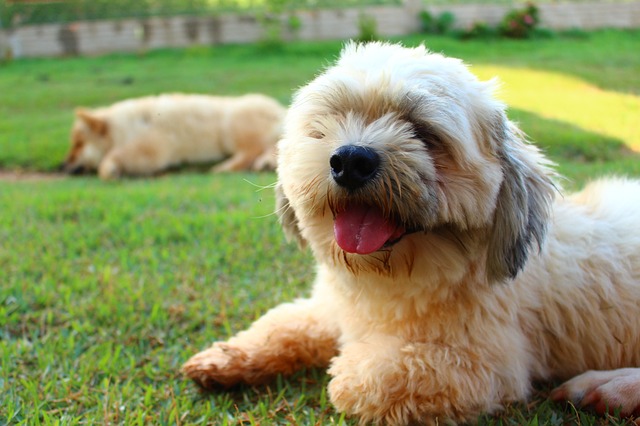What do you do if your dog keeps flicking its tongue out? Well, the answer to that would really depend on the cause of the behavior.
For example, if the cause is:
- Impatience or anticipation — ignore the behavior
- Affection and friendliness — reward it with treats, pats, or even just a smile
- Submissiveness, fear, or anxiety — examine the root of those feelings and address them, if necessary
- Nausea — ensure that your dog hasn’t eaten any toxic foods and get it to a vet
- Epilepsy — have a vet confirm the diagnosis and prescribe the appropriate medication
- Dehydration or dermatological issues — either give the dog water or apply a vet-approved ointment to the lips and nose
Should I Be Worried If My Dog Keeps Flicking Its Tongue Out?
Several weeks ago, I noticed my dog performing a tic I quickly realized I’d seen many times before.
Right after I’d given it the antiparasitic pill the vet had prescribed, my pup licked its nose.
I suddenly remembered all the times I’d seen the movement before and my mind started reeling. But should I be worried if my dog keeps flicking its tongue out?
Before I started researching the issue, I didn’t think I’d discover a dire reason for the movement.
Other than the time I’ve mentioned, I could only remember my mutt flicking its tongue out of affection.
Still, there are several potentially concerning reasons a dog might repeatedly flick its tongue out. But before we get into those, let’s review the more neutral causes of the behavior.
Potential Reasons My Dog Keeps Flicking Its Tongue Out
As a pet parent, you probably understand why I was concerned after realizing that my beloved dog keeps flicking its tongue out.
But before I start worrying, I always like to examine the circumstances in which something like that might happen.
To that end, I’m going to go through several scenarios that might give us some insight into this baffling behavior.
Impatience
Whenever my dog flicks its tongue out while I’m trying to extract a tick or brush its coat, I get the distinct impression that it’s annoyed with my sluggish process.
In those cases, I’m inclined to believe that the tongue flicks are an expression of the mutt’s impatience.
It may be one of the lesser-known explanations for the motion, but it certainly makes sense, especially if we take into account naturally restless breeds.
On the other hand, the same behavior might indicate that the dog in question is joyfully expectant, rather than exasperated.
Anticipation
Canines are natural hunters and we should all be able to recognize the telltale signs they exhibit when they spot prey.
The stiff back pointed ears, and yes, even the occasional tongue flick are all there. But the odd squirrel a dog might see at the park isn’t the only thing that can prompt these actions.
A simple game of fetch could cause a tongue flick if you time it correctly. So try to use that knowledge to induce a tongue movement the next time you play with your dog.
If you withhold a toy for just long enough and throw in a few feints for good measure, you should see that breathless anticipation starts to form.
The dog should exhibit many of the cues we’ve discussed but without the aggressive drive. In short, a tongue flick could very well be a sign of excitement, in the right circumstances.
However, if your dog keeps flicking its tongue out for a long time after such a brief diversion, you might need to spend some extra time training it to be less excitable.
After all, that kind of behavior really wouldn’t fly if your dog became that eager in public.
Affection and Friendliness
Lastly, while we’re talking about benign reasons we might see a dog flicking its tongue, we ought to mention that it may simply be a show of affection.
After all, dogs learn to build familiarity through grooming in their infancy. Siblings often lick each other to clean their coats but also to connect.
But, you might be thinking, that only explains why a dog might lick you, not why it would lick the air.
Well, think of it like this: if we move while our dogs are grooming us, some of them may just keep flicking their tongues until they register we’re no longer there.
Even if they see you move away, they might keep moving their tongues for other reasons. For example, they might be waiting for a certain taste to melt away.
If a dog licks your arm after you apply lotion, the taste would stay on its tongue for a while. But, it should go without saying, you ought to keep your pup from licking cosmetics off your skin.
In any case, because of these positive associations dogs have with grooming, they may start licking the air without any prior contact.
For instance, let’s say you run into your friend while they’re walking their pup on a leash, and you notice that the dog keeps flicking its tongue out.
If the mutt recognized you while you’re still out of reach, it may have just gotten excited in advance.
The air licks may serve to indicate the dog’s friendliness before it can give you those smooches.
Submissiveness of Fear
Now that we’re at the halfway point, we’re finally getting into some of the more distressing reasons a dog might flick its tongue out.
Showing submissiveness doesn’t have to be a bad thing. A dog might flick its tongue at its owner in anticipation of a scolding or to show remorse after doing something bad.
In that case, you’ll want to see some sign of submission or at least contrition.
However, if your dog is overly submissive and withdrawn around certain people, the reason behind the behavior might be more disturbing.
Basically, if your dog exhibits signs of fear toward someone, it may be because they’ve been violent.
In that case, the only thing you could do to immediately stop the behavior is to eliminate the person from the dog’s life.
If you can’t do that, you should at least try to build the relationship between the two back up. But to do that, you’d need the aforementioned person’s help.
Alternatively, if your pooch only behaves like that when it’s near more dominant dogs, lookout for signs of hostility.
But try not to worry too much. Showing submissiveness is only dangerous if your dog does it to a person or an animal who ends up abusing it.
Anxiety
We’ve talked about dogs who flick their tongues out of deference in front of certain people or animals.
But what can we do if the continual tongue flicking is a sign of a bigger affliction?
If your dog is naturally more anxious or meek because of prior experiences, you may have to take steps to treat the cause of the behavior.
Before you do, you should know that many dogs experience anxiety at some point in their lives.
For example, if you’ve just brought your new pet home from the shelter, it may simply lack confidence.
If the dog keeps flicking its tongue out, you can assume that it’s basically a pacifying action. In other words, puppies may lick the air to calm themselves.
It may be an oral self-soothing behavior similar to the way human babies suck their thumbs.
You may have even noticed that shy puppies tend to do it more often than their extroverted siblings.
If we determine that a dog is flicking its tongue because it feels unsure, we might try to soothe it by doing the same thing.
However, if the state of anxiety doesn’t dissipate on its own, a visit to the vet may be in order.
Nausea
Lastly, there are several medical conditions that could make a dog starts licking its lips obsessively.
If your dog ever suffers from any of them, you’ll know, mostly because it won’t stop flicking its tongue until the situation is resolved.
The first of the issues that may cause this kind of behavior is nausea. If your dog eats certain toxic foods, you’ll have to take it to a vet immediately.
The same goes for if you discover that your dog has been playing in foxtail. If it ingested or inhaled the dry, spiky seeds, it will probably require immediate medical attention.
I’ve even once witnessed a dog flicking its tongue and foaming at the mouth after trying to eat a toad.
So you have to make sure your dog hasn’t eaten any forbidden fruits, so to speak, before you can determine what’s caused the behavior.
Epilepsy
There is a slight yet serious possibility that continuous episodes of tongue flicking could indeed be indicators that a dog is having seizures.
If that is the case, it may have epilepsy, which is, fortunately, a treatable condition in dogs.
Still, I recommend seeing the vet as soon as possible so they can reach a diagnosis and prescribe the proper medication.
Dehydration or Dermatological Issues
Perhaps most obviously, some dogs flick their tongues because they need to wet the surrounding skin.
Usually, all you need to do to help them out is to refill their water bowl. However, if your dog has chronically dry skin, that may warrant a visit to the vet.
They’ll be able to figure out if your dog has dermatological issues or if hot weather is behind its dehydration.
Moreover, they may give you an ointment to apply to the area the next time your dog licks its lips.
What to Do When a Dog Keeps Flicking Its Tongue Out
As you have seen, there are many potential reasons my dog keeps flicking its tongue out. Going forward, my “treatment plan” will have to depend on the cause.
Therefore, I’ll have to be vigilant about what my dog is eating and its medical condition overall.
However, we should all be secure in the knowledge that social and psychological factors are the more likely causes of this behavior.


